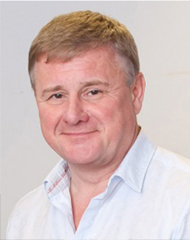
Jeremy Nicholson 院士
He obtained his PhD in Biochemistry from Kings College (St Thomas’ Hospital Medical School), London University in 1980. After a series of academic appointments in the University of London he was appointed as Full Professor of Biological Chemistry in 1992 and subsequently Head of Biological Chemistry at Imperial College London in 1998. He became head of the of the Department of Surgery and Cancer (one of the world’s largest clinical departments) in2009. In 2012 he founded the UK National Phenome Centre and became the Chairman of the International Phenome Centre Network in 2016. He left Imperial in late 2018 to become the Pro-Vice Chancellor for Health Sciences at Murdoch University and to direct the new Australian National Phenome Center. Nicholson has authored over 900 papers and articles on spectroscopy, informatics metabolic biochemistry, and systems medicine. His major research focus is on the development of diagnostic and prognostic molecular phenotyping and computational technologies as applied to problems in personalised healthcare, microbiome-host metabolic signalling metabolic diseases and cancer.
He is a Clarivate Highly-Cited Researcher (Clarivate H index = 130. Google H = 152). He has received multiple science prizes including: Royal Society of Chemistry (RSC) Silver (1992) and Gold (1997) Medals for Analytical Medal (1994); Pfizer Prize for Chemical and Medicinal Technology (2002): RSC medal for Chemical Biology (2003); RSC International Interdisciplinary Prize (2008); Pfizer Global Research Prize for Chemistry (2006), Semelweiss-Budapest International Prize for Biomedicine (2010). Professor Nicholson holds multiple honorary and adjunct professorships including: The Mayo Clinic, USA, University of New South Wales, Nanyang Technological University. Shanghai Jiao Tong University, Fudan University, The University of Western Australia, Chinese Academy of Sciences, (Institute of Atomic and Nuclear Physics where he is honorary director of the key state laboratory of nuclear magnetic resonance) and Institute of Physical and Separation Sciences. He was elected Fellow of the U.K. Academy of Medical Sciences (2010), Honorary Lifetime Fellow of the International Metabolomics Society (2012), HonoraryLifetime Member of the US Society of Toxicology (2013), Honorary Albert Einstein Professorof the Chinese Academy of Sciences in Medical Biochemistry (2014), Honorary Fellow of theRoyal College of Physicians (2018) and Honorary Doctor of Science, Honoris Causa (Hong KongBaptist University, 2019).
He is a Clarivate Highly-Cited Researcher (Clarivate H index = 130. Google H = 152). He has received multiple science prizes including: Royal Society of Chemistry (RSC) Silver (1992) and Gold (1997) Medals for Analytical Medal (1994); Pfizer Prize for Chemical and Medicinal Technology (2002): RSC medal for Chemical Biology (2003); RSC International Interdisciplinary Prize (2008); Pfizer Global Research Prize for Chemistry (2006), Semelweiss-Budapest International Prize for Biomedicine (2010). Professor Nicholson holds multiple honorary and adjunct professorships including: The Mayo Clinic, USA, University of New South Wales, Nanyang Technological University. Shanghai Jiao Tong University, Fudan University, The University of Western Australia, Chinese Academy of Sciences, (Institute of Atomic and Nuclear Physics where he is honorary director of the key state laboratory of nuclear magnetic resonance) and Institute of Physical and Separation Sciences. He was elected Fellow of the U.K. Academy of Medical Sciences (2010), Honorary Lifetime Fellow of the International Metabolomics Society (2012), HonoraryLifetime Member of the US Society of Toxicology (2013), Honorary Albert Einstein Professorof the Chinese Academy of Sciences in Medical Biochemistry (2014), Honorary Fellow of theRoyal College of Physicians (2018) and Honorary Doctor of Science, Honoris Causa (Hong KongBaptist University, 2019).
